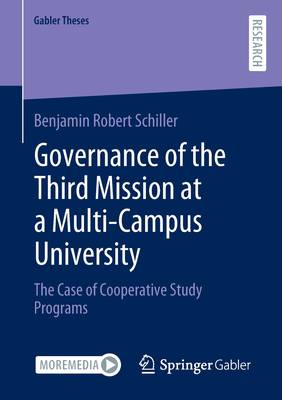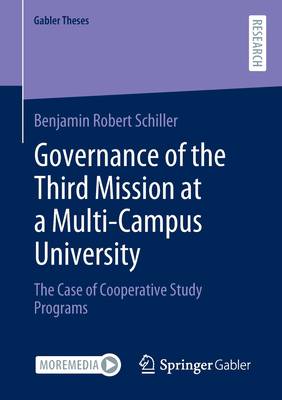
- Retrait gratuit dans votre magasin Club
- 7.000.000 titres dans notre catalogue
- Payer en toute sécurité
- Toujours un magasin près de chez vous
- Retrait gratuit dans votre magasin Club
- 7.000.000 titres dans notre catalogue
- Payer en toute sécurité
- Toujours un magasin près de chez vous
Governance of the Third Mission at a Multi-Campus University
The Case of Cooperative Study Programs
Benjamin Robert Schiller
105,45 €
+ 210 points
Description
This book appeals to higher education scholars from various disciplines and practitioners looking for an overview and in-depth insight into cooperative study programs (CSPs). The CSPs combine elements of higher education with elements of professional work and illustrate how a teaching-related third mission achieves a socioeconomic contribution through its underlying stakeholder interactions. In Germany, CSPs are a growing phenomenon and, at the same time, a niche in higher education with approximately 100,000 students. Higher education scholars identified CSPs a challenge to higher education governance despite the simultaneous lack of empirical data. In this vein, this book pursues the question of how stakeholders influence the governance of the third mission in the case of CSPs. The study in this book refers to the "prime" example of CSPs at a German university of applied sciences--the Baden-Wuerttemberg Cooperative State University. The analysis revealed that four stakeholder groups are salient and influence the governance of the CSPs. These include professors, industry representatives, students, and representatives of government and higher education policy.
Spécifications
Parties prenantes
- Auteur(s) :
- Editeur:
Contenu
- Nombre de pages :
- 331
- Langue:
- Anglais
- Collection :
Caractéristiques
- EAN:
- 9783658365257
- Date de parution :
- 13-01-22
- Format:
- Livre broché
- Format numérique:
- Trade paperback (VS)
- Dimensions :
- 148 mm x 210 mm
- Poids :
- 471 g







